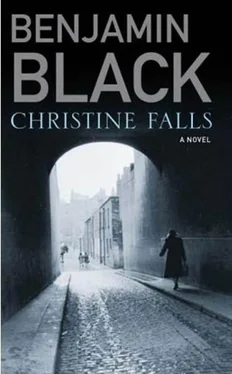He had seen Brenda on so few occasions not wearing her nurse’s uniform that for a moment he hardly knew who she was. She had knocked softly and he had turned to the door in a mixture of relief and dread, thinking it must be Phoebe who had relented and come to talk to him. Brenda entered quickly and shut the door behind her and stood with her back to it looking everywhere but at him. She wore a plain gray dress and low-heeled shoes, and had put on no makeup. He asked her what was the matter but she shook her head, still with eyes on the floor, not knowing where to begin. He stood up, stifling a gasp-his knee was very bad today, despite all the alcohol he had so far consumed-and walked around the bed and stood before her.
“I think,” she said, “I think I know who they gave the baby to.” It was as if she were talking to herself. He touched her elbow and walked with her to the bed and they sat down side by side. “I saw them here, at the Christmas party. They had a baby with them. I didn’t take much notice. Then I saw them again, at the orphanage. She had no child with her that time, and she looked-oh, she looked terrible.” She stared at her hands as if they belonged to someone else. A foghorn boomed, and she turned to the window in vague fright. Outside were fields of snow under a lowering sky of faint, soiled pink. She was thinking distractedly of home, of the year of the big snow when she was seven or eight, and her brothers made a toboggan and let her ride with them, whooping, down the side of the long meadow. She should never have come here, to this place, should never have let herself be among these people, who were too much for her, too clever and well-off and wicked. Quirke was asking her something. “The Staffords,” she said, almost impatiently. He did not know who it was she meant. “Andy Stafford, Mr. Crawford’s driver-him and his wife. That’s who they gave the baby to, I’m sure of it.”
Quirke saw again the back of the young man’s sleek, small head and his glossy dark eye in the driving mirror. He reached forward and turned the two photographs to face the wall again.
IT TOOK A LONG TIME FOR A TAXI TO COME FROM BOSTON. THERE WERE more snow flurries and the driver, a miniature Mexican whose forehead was just about level with the steering wheel, kept up a low, querulous moaning as he negotiated the winding roads out of North Scituate under an ever-darkening sky. Quirke and Brenda Ruttledge sat facing away from each other in the back seat. An odd constraint, a kind of embarrassment, almost, had settled between them, and they did not speak. Brenda wore a black coat with a hood that gave her, incongruously, the look of a nun. South Boston was deserted. Skirls of snow swept over the pavements, and in the roadway the tracks of cars were lined with brownish slush. On Fulton Street the frame houses seemed crouched against the cold and the blown snow. Quirke had got the address, not without difficulty, from Deirdre, Rose Crawford’s mousy maid.
A narrow-faced woman in a brown apron came to the door of the house and looked them up and down distrustingly, this ill-matched couple, taking in Quirke’s walking stick and Brenda’s habitlike greatcoat. Quirke said they had come from Mr. Crawford’s house. “He died, didn’t he?” the woman said. Her face at the side of her nose bore a recent, angry gray and purple bruise. She told them the Staffords lived upstairs but that Andy Stafford was not there. “Far as I know he’s out at Scituate,” she said, sounding suspicious. She did not like any of this, these two coming to her door, and asking after Andy, and looking like they knew something bad about him. Quirke asked if Mrs. Stafford was at home and she shrugged and made a dismissive grimace, baring an eyetooth. “I guess. She never goes out, hardly.”
Despite the snow on the ground she followed them around the side of the house and stood under the shelter of the eaves with her arms folded and watched them climb the wooden steps. Quirke knocked with his knuckle on the glass of the French door. No answering sound came from within. “Probably open,” the woman called up. Quirke tried the handle; it turned without resistance. They stepped, he and Brenda, into the narrow hallway.
They found Claire Stafford sitting on a spindle-backed chair at a table in the kitchenette. She wore a pink housecoat, and was barefoot. She was sitting sideways, motionless, with one hand in her lap and the other resting on the plastic tabletop. Her pale hair looked damp and hung lankly in strings on either side of her stark white face. Her eyes were rimmed with pink, and there was no color in her lips.
“Mrs. Stafford?” Brenda said softly. Still Claire gave no response. “Mrs. Stafford, my name is Ruttledge, I’m-I was Mr. Crawford’s nurse. Mr. Crawford, Andy’s-Andy’s boss. He died-Mr. Crawford died-did you know that?”
Claire stirred, as if at some faint, far-off sound, and blinked, and turned her head at last and looked at them. She showed no surprise or curiosity. Quirke came and stood opposite her at the table, his hand on the back of a chair for support.
“Do you mind if I sit down, Mrs. Stafford?” he asked.
She moved her head a fraction from side to side. He pulled out the chair from the table and sat, and motioned Brenda Ruttledge to come forward, and she too sat.
“We want to talk to you,” Brenda said, “about the baby-about what happened. Will you tell us?”
A look of something, of faint protest and denial, had come into Claire’s almost colorless eyes. She frowned.
“He didn’t mean to,” she said. “I know he didn’t. It was an accident.”
Quirke and Brenda Ruttledge looked at each other.
“How did it happen, Mrs. Stafford?” Quirke said. “Will you tell us how the accident happened?”
Brenda reached out and put her hand over Claire’s hand where it lay on the table. Claire looked at her and at their two hands. When she spoke it was Brenda alone that she addressed.
“He was trying to make her stop crying. He hated it when she cried. He shook her. That’s all-he just shook her.” Her frown now was a frown of bewilderment and vague wonder. “Her head was heavy,” she said, “and so warm-hot, nearly.” She turned up the palm of the hand in her lap and cupped in it the recollection of the child’s head. “So heavy.”
“What did you do then?” Brenda said. “What did Andy do?”
“He telephoned, to St. Mary’s. He was a long time away, I don’t know…Father Harkins arrived. I told him about the accident. Then Andy came back.”
“And Father Harkins,” Quirke asked, “did he call the police?”
She drew her eyes away from Brenda’s face and looked at him.
“Oh, no,” she said simply. She turned to Brenda again, appealing to another woman, to her good sense. “Why would he do that? It was an accident.”
“Where is she, Mrs. Stafford,” Quirke said, “where’s the baby?”
“Father Harkins took her. I didn’t want to see her anymore.” Again she appealed to Brenda. “Was that bad of me?”
“No,” Brenda said soothingly, “no, of course not.”
Claire looked again into her cupped palm.
“I could still feel her head in my hand. I can still feel it.”
The silence in the room grew heavy. Quirke had a sense of something coming into the house, wafting in, soft and soundless like the snow outside. He was suddenly tired, with a tiredness he had never known before. He felt as if he had come to the end of a road on which he had been traveling for so long his trudging on it had begun to seem a state of rest, a rest however which afforded him no respite but made his bones ache and his heart labor and his mind go dull. Somewhere along that difficult way he seemed to have got lost.
ANDY KNEW WHAT THE GIRL WAS AFTER WHEN HE CAME INTO THE garage and found her sitting in the back seat of the Buick, just sitting there, in a big coat, staring in front of her, pale and sort of shocked-looking. She said nothing, and neither did he, only buttoned up his jacket and got in behind the wheel and started up the engine. He just drove, without thinking, which was what she seemed to want- Take me anywhere , she had said that first time, after they had left the big guy in the village. The snow was coming down now, it was not bad, but it meant the roads were empty. They went up along the coast again. He asked her if she had any of them English cigarettes with her today but she did not even answer, only shook her head at him in the mirror. She had that look-scared and sort of paralyzed but frantic underneath-that girls got when they could think of only the one thing. It was a look that told him it would be her first time.
Читать дальше












